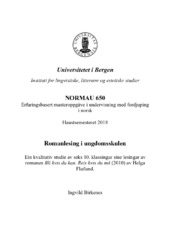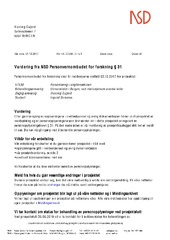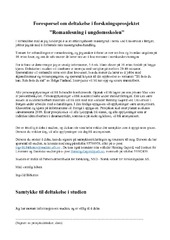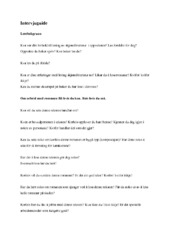| dc.contributor.author | Birkenes, Ingvild | |
| dc.date.accessioned | 2019-01-21T09:52:46Z | |
| dc.date.available | 2019-01-21T09:52:46Z | |
| dc.date.issued | 2018-12-11 | |
| dc.date.submitted | 2018-12-10T23:00:04Z | |
| dc.identifier.uri | https://hdl.handle.net/1956/18927 | |
| dc.description.abstract | Føremålet med denne avhandlinga er å undersøkja korleis arbeidet med ein romantekst verkar inn på unge lesarar. Eg har undersøkt 10. klassingar sine lesingar av romanen Bli hvis du kan. Reis hvis du må (2010) skriven av Helga Flatland. Eg var interessert i å finna ut av både korleis dei opplevde å lesa denne teksten, men også å undersøkja kva språk dei nytta når dei snakka om romanteksten. I tillegg har eg sett på haldningane deira til å jobba med skjønnlitteratur i norskfaget generelt. For å finna ut av dette, har eg gjennomført intervju med seks 10. klassingar i etterkant av ei felles lesing av romanen i klassen deira. Som teoretisk rammeverk støttar eg meg til James Paul Gee (2008) sin diskursteori, der omgrepa primær- og sekundærdiskurs er sentrale. I tillegg er den lesarorienterte litteraturteorien med Wolfgang Iser (1988) og særleg Louise Rosenblatt (1995) sitt syn på kva litteraturundervising er, viktige i analysen. Eg ser også på materialet i ljos av J.A. Appleyard (1991) sine utviklingsstadum i det å bli ein skjønnlitterær lesar, med særleg fokus på ungdomslesaren, lesaren som tenkjar. Danning og literacy er sentrale omgrep i norskfaget, dei er også viktige i analysearbeidet mitt. Resultata viser at alle informantane har ein motivasjon for å jobba med tekst i norskfaget, og alle viser evne til å kunna snakka om den aktuelle romanen. Materialet viser at dei i stor grad brukar primærspråket sitt når dei snakkar om leseerfaringane sine. Gjennom primærspråket involverer dei seg med karakterane, dei brukar eigne erfaringar til å fylla tomrom i teksten, dei les med litterær fordobling og viser ei metaforståing om tekst og leseprosess. Dei har ei utforskande tilnærming til teksten. I tillegg viser datamaterialet at elevane hugsar få tekstutdrag og noveller dei les, noko som også samsvarer med tidlegare undersøkingar gjort av m.a. Penne (2006) og Skarstein (2013). Tidsbruk, kontekst, tilnærmingsmåte og undervisingsmetode er viktige faktorar for kva elevane sit att med. Å lesa i eit fellesskap er verdifullt for elevane, og dei meiner at dei vidareutviklar eigne lesingar av å lytta til kvarandre. I diskusjonen stiller eg spørsmål ved om det i norskfaget er for lite anerkjenning av elevane sitt primærspråk i arbeidet med skjønnlitteratur, og eg ser på tilhøvet mellom lesing som utforsking, språk og danning i ljos av elevytringane. | en_US |
| dc.description.abstract | The purpose of this thesis is to examine how a literary study of a novel influences young readers. I have examined how students in 10th grade interpret the novel Bli hvis du kan. Reis hvis du må (2010) written by the Norwegian author Helga Flatland. I wanted to explore their perception of the text as well examine what language they used when they talked about the novel. In addition, I have examined their attitudes towards working with fiction in general. To find out I interviewed six students in 10th grade after a group reading of the novel. As theoretical framework I use James Paul Gee´s (2008) theory on Discourse, where the concepts primary and secondary Discourse are essential. Reader- response criticism with Wolfgang Iser (1988) and especially Louise Rosenblatt´s (1995) view of what a literary work is, have been important in the analysis. I have also looked at the material in light of J.A. Appleyard´s (1991) developmental model of the reading process, with particular focus on adolescent readers, the reader as thinker. The concepts of culture and literacy are central terms in the curriculum of Norwegian, and they are also important to my work. The results show that all the informants are motivated to work with fiction, and all of them show the ability to talk about the novel in question. The material shows that they mostly use their primary Discourse when they talk about their experiences with the text, and through their primary Discourse they show the ability to connect with the characters, they use their own experiences to fill out empty spaces in the text, they read the text on different levels, and they express a metacognitive understanding of text and the reading process in general. In all they have an exploratory approach towards the text. The material also shows that the students remember very few of the extracts and short stories they read. This also correspond to earlier research done by Penne (2006) and Skarstein (2013). Time spent, context, approach, and methods of teaching are all important factors to what the students remember of a text. To read in a class community is valuable for the students, and they feel they develop as readers by listening to each other. In the discussion I question whether the primary Discourse of the students is sufficiently recognized when working with fiction in the Norwegian curriculum, and I examine the relationship between exploration, Discourse, and culture in the light of the students´ own comments. | en_US |
| dc.language.iso | nno | eng |
| dc.publisher | The University of Bergen | eng |
| dc.subject | Norsk litteratur | |
| dc.subject | Skjønnlitteratur | |
| dc.subject | Norskfaget | |
| dc.subject | Ungdomstrinnet | |
| dc.subject | Litteraturundervisning | |
| dc.title | Romanlesing i ungdomsskulen. Ein kvalitativ studie av seks 10. klassingar sine lesingar av romanen Bli hvis du kan. Reis hvis du må (2010) av Helga Flatland. | eng |
| dc.type | Master thesis | |
| dc.date.updated | 2018-12-10T23:00:04Z | |
| dc.rights.holder | Copyright the author. All rights reserved | eng |
| dc.description.degree | Erfaringsbasert masteroppgåve i undervisning med fordjupning i norsk | |
| dc.description.localcode | VID-MAUNOR | |
| dc.description.localcode | NORMAU650 | |
| dc.subject.nus | 711123 | eng |
| fs.subjectcode | NORMAU650 | |
| fs.unitcode | 11-21-0 | |



